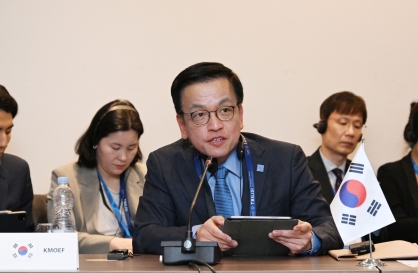S. Korea-Japan military deal may be inked Wednesday
By Yoon Min-sikPublished : Nov. 21, 2016 - 17:05
South Korea’s Defense Ministry said Monday that it may clinch the disputed military information-sharing agreement with Japan as early as Wednesday.
The bilateral General Security of Military Information Agreement, which was tentatively signed on Nov. 14, will be put to a vote at a Cabinet meeting Tuesday.
“The signing of the deal will take place as early as Wednesday, at (the South Korean) Ministry of National Defense. ... It will be done as soon as President (Park Geun-hye) endorses it,” said ministry spokesman Moon Sang-kyun. He said Defense Minister Han Min-koo will represent the South Korean side while Japanese Ambassador to South Korea Yasumasa Nagamine will be the proxy for the Tokyo government.
The deal will come into effect immediately after the signing, as it does not require parliamentary ratification.
South Korea has been seeking to resume the stalled talks for the GSOMIA, with Minister Han repeatedly stressing the necessity of acquiring information to defend against North Korean threats.
The two countries currently share military intelligence via the Trilateral Information Sharing Arrangement with the US as the mediator, but military officials have called for a direct exchange of information.
The main benefits for South Korea are Japan’s superior intelligence assets, namely six Aegis-equipped destroyers, advanced radars and anti-submarine reconnaissance equipment, including patrol planes and early warning aircrafts.
But there has been a dispute over whether the advanced anti-submarine reconnaissance equipment by Japan is crucial, as most North Korean submarines are old and have limited operating capacity in waters far from its coasts.
Information provided by South Korea will mostly be data gained from the interception of signals, or SIGINT, gathered at North Korean facilities located from the inter-Korea border to around Pyongyang by reconnaissance aircrafts.
Another aspect will be human intelligence, or HUMINT, gathered by the human network established by high-ranking North Korean defectors or others who have contact with the reclusive country.
The ministry said it would not share top-level military secrets with Japan. In accordance to a law revision in 2013, Japan will exclude information from the four categories of defense, diplomacy, anti-espionage and terror prevention that would severely hinder its national security.
Although it is still unclear whether the draft will be revealed to the public, the ministry said Japan’s stance is that it should be. It said the overall outline of the deal will be similar to that of 2012, when a near-complete GSOMIA was scrapped due to backlash from the South Korean public.
The ministry announced on Oct. 27 that it was restarting the negotiations, citing the elevated nuclear and missile threats from North Korea. Pyongyang conducted its fourth and fifth nuclear test, along with more than 20 ballistic missile test-launches, this year.
The breakneck speed of the resumed negotiations has touched off suspicions the government was trying to close the much-disputed deal while the public is preoccupied with a nationwide scandal. The influence-peddling scandal involving the president’s civilian friend Choi Soon-sil has resulted in over 1 million citizens coming to the streets to call for Park’s resignation, with the president being a suspect in a criminal investigation.
The bilateral General Security of Military Information Agreement, which was tentatively signed on Nov. 14, will be put to a vote at a Cabinet meeting Tuesday.
“The signing of the deal will take place as early as Wednesday, at (the South Korean) Ministry of National Defense. ... It will be done as soon as President (Park Geun-hye) endorses it,” said ministry spokesman Moon Sang-kyun. He said Defense Minister Han Min-koo will represent the South Korean side while Japanese Ambassador to South Korea Yasumasa Nagamine will be the proxy for the Tokyo government.
The deal will come into effect immediately after the signing, as it does not require parliamentary ratification.
South Korea has been seeking to resume the stalled talks for the GSOMIA, with Minister Han repeatedly stressing the necessity of acquiring information to defend against North Korean threats.
The two countries currently share military intelligence via the Trilateral Information Sharing Arrangement with the US as the mediator, but military officials have called for a direct exchange of information.
The main benefits for South Korea are Japan’s superior intelligence assets, namely six Aegis-equipped destroyers, advanced radars and anti-submarine reconnaissance equipment, including patrol planes and early warning aircrafts.
But there has been a dispute over whether the advanced anti-submarine reconnaissance equipment by Japan is crucial, as most North Korean submarines are old and have limited operating capacity in waters far from its coasts.
Information provided by South Korea will mostly be data gained from the interception of signals, or SIGINT, gathered at North Korean facilities located from the inter-Korea border to around Pyongyang by reconnaissance aircrafts.
Another aspect will be human intelligence, or HUMINT, gathered by the human network established by high-ranking North Korean defectors or others who have contact with the reclusive country.
The ministry said it would not share top-level military secrets with Japan. In accordance to a law revision in 2013, Japan will exclude information from the four categories of defense, diplomacy, anti-espionage and terror prevention that would severely hinder its national security.
Although it is still unclear whether the draft will be revealed to the public, the ministry said Japan’s stance is that it should be. It said the overall outline of the deal will be similar to that of 2012, when a near-complete GSOMIA was scrapped due to backlash from the South Korean public.
The ministry announced on Oct. 27 that it was restarting the negotiations, citing the elevated nuclear and missile threats from North Korea. Pyongyang conducted its fourth and fifth nuclear test, along with more than 20 ballistic missile test-launches, this year.
The breakneck speed of the resumed negotiations has touched off suspicions the government was trying to close the much-disputed deal while the public is preoccupied with a nationwide scandal. The influence-peddling scandal involving the president’s civilian friend Choi Soon-sil has resulted in over 1 million citizens coming to the streets to call for Park’s resignation, with the president being a suspect in a criminal investigation.

The deal itself has been subject to much scrutiny, particularly given Seoul’s chilly relationship with Japan over history and its claims over the Korean islets of Dokdo.
An apparent flip-flop by the government was also criticized. Earlier this year, Minister Han vowed not to pursue the deal without public consent.
A Gallup Korea survey last week showed that 59 percent of people were against the Seoul-Tokyo GSOMIA, which was consistent with other poll results indicating that more people are against the deal than for it.
“I never meant that the public consent was a precondition to (the GSOMIA),” Han said last week.
By Yoon Min-sik (minsikyoon@heraldcorp.com)
An apparent flip-flop by the government was also criticized. Earlier this year, Minister Han vowed not to pursue the deal without public consent.
A Gallup Korea survey last week showed that 59 percent of people were against the Seoul-Tokyo GSOMIA, which was consistent with other poll results indicating that more people are against the deal than for it.
“I never meant that the public consent was a precondition to (the GSOMIA),” Han said last week.
By Yoon Min-sik (minsikyoon@heraldcorp.com)





![[Weekender] Korean psyche untangled: Musok](http://res.heraldm.com/phpwas/restmb_idxmake.php?idx=644&simg=/content/image/2024/05/02/20240502050841_0.jpg&u=)

![[Eye Interview] 'If you live to 100, you might as well be happy,' says 88-year-old bestselling essayist](http://res.heraldm.com/phpwas/restmb_idxmake.php?idx=644&simg=/content/image/2024/05/03/20240503050674_0.jpg&u=)










![[Herald Interview] Director of 'Goodbye Earth' aimed to ask how we would face apocalypse](http://res.heraldm.com/phpwas/restmb_idxmake.php?idx=652&simg=/content/image/2024/05/03/20240503050732_0.jpg&u=)
